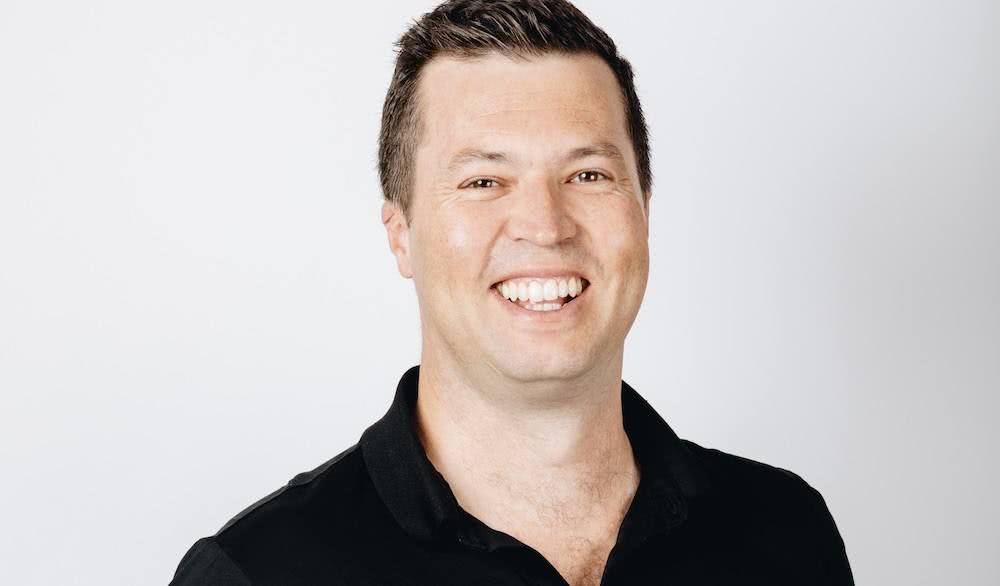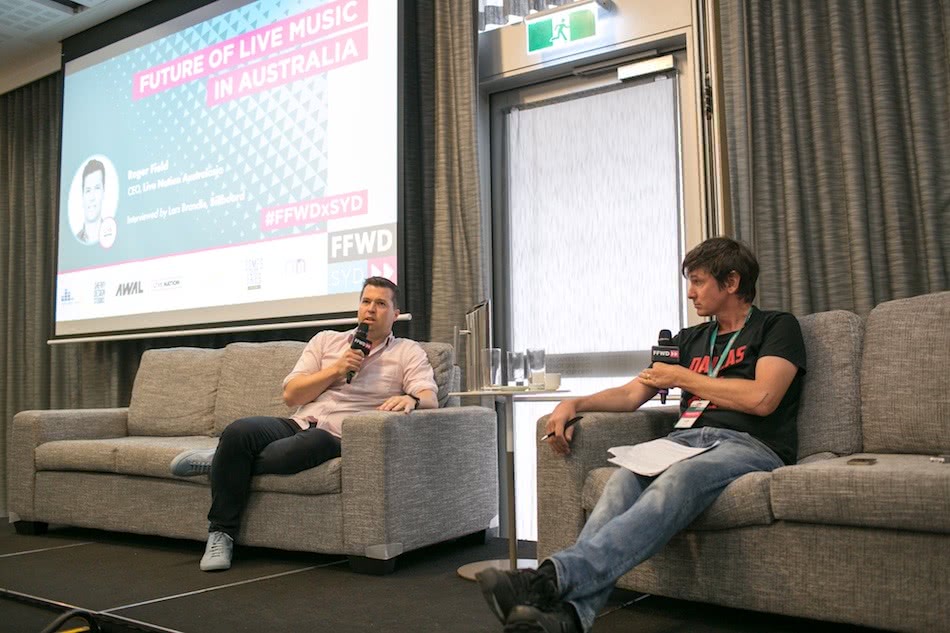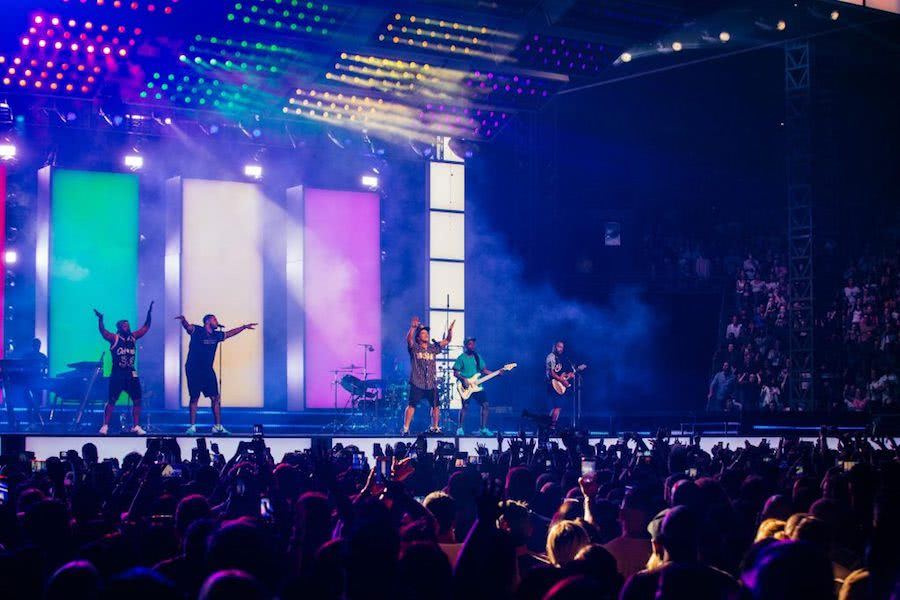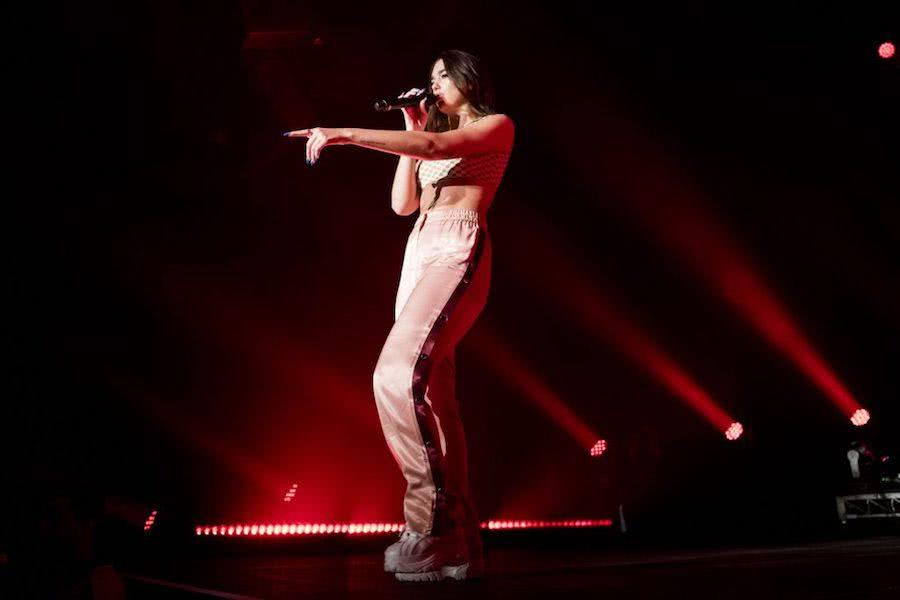5 Questions with Live Nation Australasia CEO Roger Field: ‘We as an industry are terrible at educating consumers’

From venues to ticketing, festivals on both sides off the Tasman and concerts filling out theatres up to stadiums, Live Nation Australasia has more moving parts than a Swiss watch. Roger Field is in charge of all that machinery.
The veteran live music professional got his start in ticketing, before a position came up with Michael Coppel Presents in 2003 which shifted his career into concert promotion. In 2010, Field joined colleague Luke Hede in launching the Live Nation Australia and New Zealand office and, in 2012, they were reunited with Coppel when Live Nation bought MCP.
It’s been on a growth trajectory ever since. Field has been a big part of the company’s success and he was rewarded with a promotion from COO to CEO last year. The clock never stops for Live Nation, which has tours for Pink, Taylor Swift, Def Leppard and many more on its slate.
TIO caught up with Field for an onstage Q&A at the FastForward conference in Sydney. Below is a transcript from that chat.
There’ an old industry cliché, you have to start at the bottom to get to the top. Is that still accurate?
The only way to really make it in the business with credibility is to start somewhere in the key functioning part of it. You can do degrees and you can try educate yourself but practical education is the key to ascending in this business, because it really is so weird in so many respects.
My career started as a pig farmer. I was bad at that. And then a lettuce farmer, and I was bad at that. So on a gap year in London, out of desperation I ended up in a call centre at Janet Holmes a Court’s Stoll Moss theatres, which owned 11 of the theatres in Shaftesbury Avenue in the West End.

Roger Field and Lars Brandle
I spent the last six months of my time in London selling tickets for the opera and other wonderful attractions. I came back to Australia and Ticketek had just expanded into Victoria to take on Ticketmaster, or BASS as it was known then. I basically walked straight into their call centre and started selling tickets for Sunset Boulevard. Through ticketing, I think a lot of careers in this business start.
Live Nation has grown very large. You’ve got a growing portfolio of festivals, venues, and there’s Ticketmaster. There’s certainly a perception among consumers that Ticketmaster and the live business doesn’t do enough to curb the effects of scalping and the resale market. What’s the dialog your company will have with the public and the wider industry?
We’re constantly having a dialogue. There’s a couple of angles to this topic. First and foremost, sale and resale of tickets has existed, they were probably reselling tickets to the Colosseum in Rome.
It’s not a new thing. When I was working in London back in the theatre days, there were hundreds of people reselling tickets that were sold for shows out of holes in the wall.
It’s just gone into the online space, which makes it more high profile and makes it more immediate. The conversation is focused in the wrong areas. If we talk about the primary, we’re talking about the future of live music.
We really underdeveloped in our strategies in the primary ticketing market. Someone made a comment about the fact we still sell cardboard tickets? We have got to be one of the last forms of accessing anything that isn’t using either touch screen or facial recognition.
We’re still selling tickets the same way we always did. What we do is effectively retail, and other retailers have much more robust pricing strategies.
They consider things like discounting, which I know is always a hot topic in this business. They actually consider a pricing strategy as part of a campaign not as a panic, “burn the house down” at the end of a sales period for a tour.
We’re obviously not recognising that there are people who are prepared to pay more for tickets. I have met people who buy from the secondary market because it’s convenient and they don’t want the rush and scurry of trying to secure tickets when everybody else is trying to buy them at the same time.
Part of the challenge with the secondary market is education. We as an industry are terrible at educating consumers. We’re very, very bad at talking to them.
The majority of tickets are going into the right hands. That’s just the reality. The proportion of what we’re talking about on the secondary market is not as big as it’s made out to be.
When talking about the secondary market, what we should be focused on is illegitimate resale and lack of accountability in that space. The issue we have in the secondary space is there are so many people operating in it, who don’t hold the seller to account for what they say they’re selling, and the consumer at the end is being taken for a ride.
You should get a refund if you don’t get what you paid for. There are operators that do that. On the Bruno Mars tour, over a quarter of a million tickets sold.

Bruno Mars in Sydney Credit: Ash Mar
We were logging how many issues we had at the box office for invalid secondary tickets and there was only about 200, of which about 60% came from Viagogo. It’s actually about what we do in the space to improve our first sale of the ticket and to improve the accountability of those operating in the space.
What can be done to get more women in senior positions in live music?
A lot can be done but I think we’re late to it. Our gender split ratio in our promotions business is nearly 30% male, 70% female. But at the top tier, it’s very male orientated.
And that’s a very open discussion we’ve been having since the business launched our diversity inclusion program. So we are spending a lot of time and effort, which I hope is paying off, in focusing on developing our young leaders in the business.
A lot of whom are female. Our average age is 39. Whether it’s historical, I don’t know what the reasons are. Let’s not forget (Secret Sounds Group co-CEO) Jess Ducrou, who is at the top of the crew in our business and a superb operator.
Susan Heymann (general manager) at Chugg (Entertainment) is another great operator at the top of the game. In venues, there are a lot of senior females coming through, like Trish McNamara, GM of Brisbane Entertainment Centre. We need to keep working on it. It’s not necessarily just gender, we need to see more diversity across the board. We need to spend time and money on it, basically.
You mentioned Jess Ducrou. Live Nation bought a stake in Secret Sounds last year, which gives you a suite of festivals. Festivals are a big part of your game now. There’s surely a lot of opportunity, considering the big four are now out of the market. What’s your take?
Festivals are a critical part of the ecosystem. You can’t be a concert producer and execute a festival. Which is why we have the Secret Sounds partnership. We tried to produce the V festival for three years from our office at MCP and they are a huge drain (on resources).
I don’t know if people appreciate how much work goes into festivals. It’s absolutely a year’s worth of work if you want to execute it well. We identified the options that we could either start up or get into the festivals game the way we have.
And we have a bunch of great festival brands globally, one of which is Download. I really wanted to do Download but there was no way we had the resources to be able to execute it on the ground.
I think those festivals went under because they really weren’t integrated into a broader business; we all have to integrate and diversify to actually generate the turnover that we need in a world where the artists are expected to pay more and it can’t always be the ticket buyer who is spending all the money.
It’s also a key way for us to be able to present an artist with a strategy, for the increasing amount of investment that we’re making in developing careers. When we’re developing an artist we will look at a year or two of touring where we can do an album launch phase around the major festivals and then bring them back for a tour the next year.
The beauty of Splendour and Falls, apart from being great brands, is their locations actually add to the show count you can offer an artist. We’re a long way away from anywhere else.
To justify the expense of coming down here, the more shows we can offer and the more strategies we can bring to the table to help make it feasible, the better.
I don’t think we’ll see touring festivals again. It’s not feasible. Every market in Australia is not the same. I don’t think the same thing works in every market the same way.
Gone are the days when an artist can block out a month to come down here and do four or five shows on a touring festival. We’ll continue to develop the festival portfolio but we’ll do it on the basis of markets that will benefit and are calling out for a festival, not on the basis of just trying to build something that’s not sustainable.
What’s Live Nation’s plan for the five years ahead?
We’ll obviously continue to grow and develop. We’re investing a huge amount of money in a couple of areas, one is of course artist development.
We have invested in Dua Lipa to play down here, now she can probably play arenas. We did the same thing through Asia and its really paying off.

Dua Lipa in Sydney. Credit: Ash Mar
We have a huge number of artists that are on development deals where we will identify someone or a band who we feel has great potential and we’ll upfront a bunch of their capital costs so they can be active in the touring market. And we partner with them until that deal recoups.
It’s really, I think, a really refreshing strategy that we can have because we’re not just in Australia. And just competing in this market for new talent.
From that perspective in Australasia, it’s really put us on the map. Because it can make completely no financial sense for an artist to come all the way down here, but if they’re part of our ecosystem and we’re developing them, the fact they are blowing up in the U.S. can help justify, putting Australia on the map as a priority. And if you crack this market, it’s a fantastic market.
:: Roger Field of Live Nation Australasia – Fear At The Top interview
This article originally appeared on The Industry Observer, which is now part of The Music Network.


































